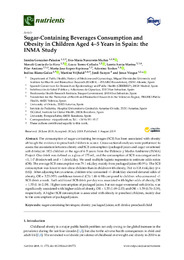Por favor, use este identificador para citar o enlazar este ítem:
https://hdl.handle.net/11000/38519Registro completo de metadatos
| Campo DC | Valor | Lengua/Idioma |
|---|---|---|
| dc.contributor.author | González Palacios, Sandra | - |
| dc.contributor.author | Navarrete-Muñoz, Eva María | - |
| dc.contributor.author | Garcia de la Hera, Manuela | - |
| dc.contributor.author | Torres-Collado, Laura | - |
| dc.contributor.author | SANTA MARINA, LORETO | - |
| dc.contributor.author | Amiano, Pilar | - |
| dc.contributor.author | Lopez-Espinosa, Maria-Jose | - |
| dc.contributor.author | Tardon, Adonina | - |
| dc.contributor.author | Riano-Galan, Isolina | - |
| dc.contributor.author | Vrijheid, Martine | - |
| dc.contributor.author | Sunyer, Jordi | - |
| dc.contributor.author | Vioque, Jesús | - |
| dc.contributor.other | Departamentos de la UMH::Salud Pública, Historia de la Ciencia y Ginecología | es_ES |
| dc.date.accessioned | 2025-11-26T13:19:19Z | - |
| dc.date.available | 2025-11-26T13:19:19Z | - |
| dc.date.created | 2019-08-01 | - |
| dc.identifier.citation | Nutrients. 2019 Aug 1;11(8):1772 | es_ES |
| dc.identifier.issn | 2072-6643 | - |
| dc.identifier.uri | https://hdl.handle.net/11000/38519 | - |
| dc.description.abstract | The consumption of sugar-containing beverages (SCB) has been associated with obesity although the evidence in preschool children is scarce. Cross-sectional analyses were performed to assess the association between obesity and SCB consumption (packaged juices and sugar-sweetened soft drinks) in 1823 children at the age of 4-5 years from the INfancia y Medio Ambiente (INMA) Project. One drink was defined as a glass of 175 mL, and the consumption of SCB was categorized in <1, 1-7 drinks/week and > 1 drink/day. We used multiple logistic regression to estimate odds ratios (OR). The average SCB consumption was 79.1 mL/day, mainly from packaged juices (80.9%). The SCB consumption was lower in non-obese children than in children with obesity, 76.6 vs 118.4 mL/day (p = 0.02). After adjusting for covariates, children who consumed >1 drink/day showed elevated odds of obesity, OR = 3.23 (95% confidence interval (CI): 1.48-6.98) compared to children who consumed <1 SCB drink a week. Each additional SCB drink per day was associated with higher odds of obesity, OR = 1.55 (1.14-2.09). Higher consumption of packaged juices, but not sugar-sweetened soft drinks, was significantly associated with higher odds of obesity, OR = 1.55 (1.09-2.15) and OR = 1.59 (0.76-3.39), respectively. A higher SCB consumption is associated with obesity in preschool children, mainly due to the consumption of packaged juices. | es_ES |
| dc.format | application/pdf | es_ES |
| dc.format.extent | 13 | es_ES |
| dc.language.iso | eng | es_ES |
| dc.publisher | MDPI | es_ES |
| dc.rights | info:eu-repo/semantics/openAccess | es_ES |
| dc.rights | Attribution-NonCommercial-NoDerivatives 4.0 Internacional | * |
| dc.rights.uri | http://creativecommons.org/licenses/by-nc-nd/4.0/ | * |
| dc.subject | sugar-containing beverages | es_ES |
| dc.subject | obesity | es_ES |
| dc.subject | packaged juices | es_ES |
| dc.subject | soft drinks | es_ES |
| dc.subject | preschool child | es_ES |
| dc.title | Sugar-Containing Beverages Consumption and Obesity in Children Aged 4–5 Years in Spain: the INMA Study | es_ES |
| dc.type | info:eu-repo/semantics/article | es_ES |
| dc.relation.publisherversion | 10.3390/nu11081772 | es_ES |

Ver/Abrir:
Sugar-Containing Beverages Consumption and.pdf
632,13 kB
Adobe PDF
Compartir:
 La licencia se describe como: Atribución-NonComercial-NoDerivada 4.0 Internacional.
La licencia se describe como: Atribución-NonComercial-NoDerivada 4.0 Internacional.
.png)